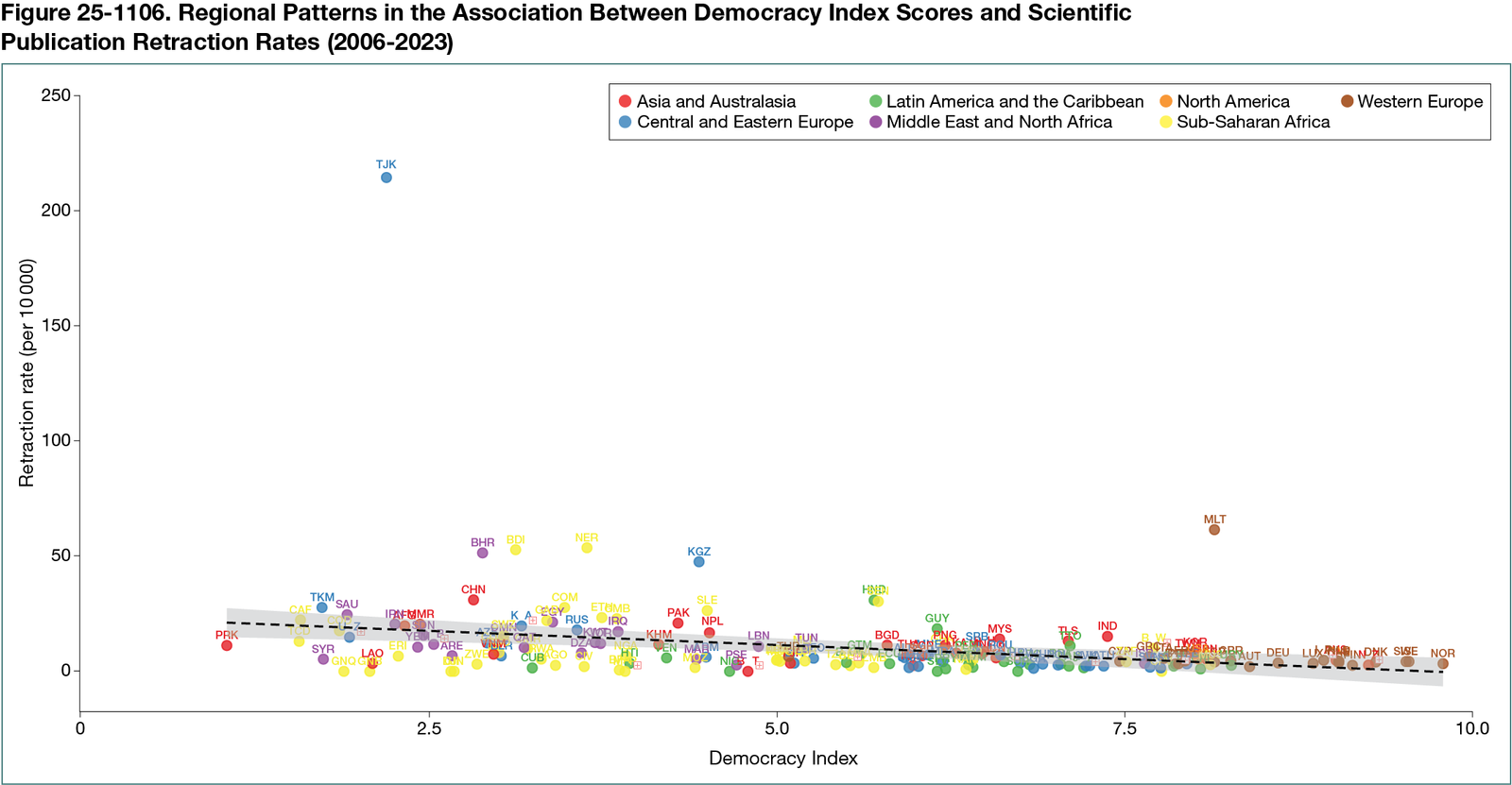Retractions and Democracy Index Scores Across 167 Countries
Abstract
Ahmad Sofi-Mahmudi,1 Hesam Salmabadi2
Objective
To evaluate the association between countries’ democratic status and scientific article retraction rates while exploring potential factors influencing this association.
Design
This retrospective cohort study analyzed publication and retraction data from 2006 to 2023. Data sources included the Retraction Watch Database for retraction data (n = 64,264 retractions), the Economist Intelligence Unit’s Democracy Index for democratic status, and SCImago for country-specific publication outputs (n = 59,385,751 publications). Our primary outcome was retraction rate (retractions per 10,000 publications) rather than absolute retraction counts, to account for varying publication volumes across countries. Using bayesian hierarchical negative binomial regression models with multiple imputations for missing data, we examined the association between the democracy index and article retractions while controlling for key confounders, including gross domestic product (GDP) per capita, research investment as percentage of GDP, English language proficiency scores, corruption control, government effectiveness, regulatory quality, rule of law, press freedom, and international collaboration rates, across 167 countries.
Results
The analysis of 167 countries demonstrated a median democracy index score of 5.71 (range, 1.05-9.81) and a median scientific publication retraction rate of 5.3 per 10,000 publications (range, 0-214.8). Higher democracy scores were associated with lower retraction rates (adjusted coefficient, −0.46; 95% credible interval [CrI], −0.59 to −0.32) after controlling for confounders (Figure 25-1106). Among institutional factors, rule of law showed a positive association (0.40; 95% CrI, 0.17-0.63), whereas corruption control demonstrated a negative association (−0.54; 95% CrI, −0.72 to −0.36) with retraction rates. The association between democracy and retractions remained stable across periods (interaction coefficient, −0.03; 95% CrI, −0.46 to 0.39), although press freedom effects varied significantly between the 2006 to 2012 and 2013 to 2023 periods (interaction coefficient, −1.40; 95% CrI, −1.77 to −1.03). GDP per capita (0.09; 95% CrI, 0.01-0.17) and government effectiveness (0.21; 95% CrI, 0.01-0.41) were positively associated with retraction rates, suggesting better detection and correction mechanisms in wealthier, more effectively governed countries.

Conclusions
Democratic status shows a negative association with scientific article retraction rates, although this association is complex and mediated by institutional factors. The findings suggest that while democratic societies may have lower rates of problematic research requiring retraction, they also demonstrate stronger institutional capacity for detecting and addressing research misconduct.
Affiliations
1Department of Health Research Methods, Evidence and Impact, McMaster University, Hamilton, Ontario, Canada, a.sofimahmudi@ gmail.com; 2Department of Environmental Sciences, University of Quebec in Trois-Rivières, Trois-Rivières, Quebec, Canada.
Conflict of Interest Disclosures
Ahmad Sofi-Mahmudi is an employee of Cytel Canada Health Inc.
Additional Information
We used Claude, 3.5 Sonnet (claude-35-sonnet-20241022) through its website for refining the analysis codes. Also, it was used as a grammar and flow checker of the abstract.
